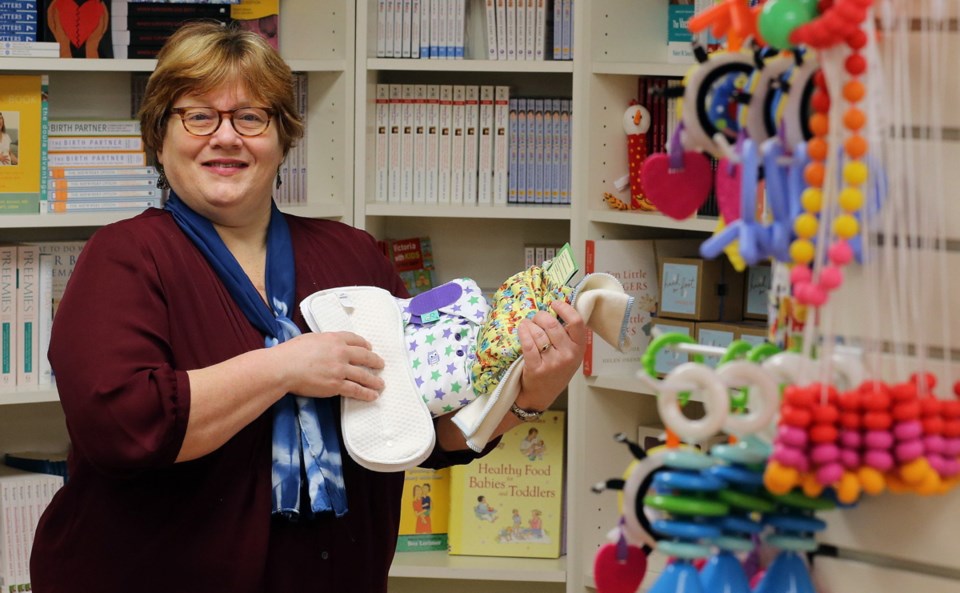When Eva Bild teaches childbirth classes to expectant parents, the most questions often come from those whose childbearing days are over — expectant grandparents.
“[Grandparents] love the childbirth class,” Bild said, a parental adviser and owner of the Mothering Touch resource centre, 975 Fort St.
“They’ll say things like: ‘Oh I wish there was something like this when I was younger’ and ‘why don’t you put one on for grandparents because I have all sorts of questions,’” she said.
So Bild is starting courses specifically for people expecting to become grandparents. The courses will involve two, two-hour sessions and give grandparents a chance to get some idea of what to expect.
Bild, who has three grown children but no grandchildren yet, said changes in prescribed baby care will make the course a surprise. Even new diapers can resemble nothing available a generation ago.
“I can easily see how somebody who had a child 25, 30 years ago would now find themselves in a quite different baby-care universe,” Bild said.
But she emphasized the course is about more than updating expectant grandparents’ knowledge of baby care. Bild hopes grandparents can begin to appreciate how their family is transforming. And that the grandparents’ relationship with their own children, now parents themselves, will change.
“From a grandparents’ perspective there is suddenly a re-calibrating,” Bild said.
Grandparents will watch and think “clearly [my daughter] needs more help as a 30-year-old mother than she ever did as a 25-year-old with only herself to look after,” she said.
“On the other hand she is more grown up now than she was as a 25-year-old,” Bild said.
Help and support can indeed be crucial at this time, especially for new mothers. Post-partum depression, now recognized as a medical condition that can be disabling, is often brought on with feelings of isolation without support.
“One of the biggest things grandparents can do is provide support.” Bild said. “That support doesn’t need to be and often shouldn’t be taking care of the baby.”
She suggested it can range: Bring over a prepared meal, take the whole family out to lunch, pay for a cleaner or just come by on a Sunday to hold the baby for an hour of two so Mom can catch a nap.
But offers of help must be provided with care. And grandparents should avoid offering advice. New parents are likely to resent it every bit as much as they did when they were teens being told what to wear.
Sometimes, grandparents will make suggestions, contrary to newest and best practice, simply because they want to spare their own child.
For example, a grandparent can see their own daughter, a new mom, becoming worn out and frazzled. So they advise letting the baby cry for a few minutes before picking it up and soothing.
“It can create conflict within families because the new mom will want to go and pick baby up, but Grandma says: ‘Don’t,’” Bild said.
“Really Grandma is just trying to protect her own daughter,” she said.
Furthermore, both grandparents and new parents can become defensive.
The older generation will take it as a criticism when the new generation of parents does things differently.
“You have a son who has just had a new baby and he puts the baby to sleep on its back, but you always put your son to sleep on his tummy,” Bild said,
“It’s hard not to take that as ‘Well, Mom, you did it wrong and you put me in danger,’ ” she said.
Bild said the most important thing is for both new parents and grandparents to recognize they are acting from the best advice they had at the time.
“We have to respect the choices our adult children make because they are making these choices in a different cultural context than when we made our choices,” Bild said.
“And I promise you when I talk to new parents I say the same thing in reverse. ‘You have to respect the choices your parents made,’” she said.
Finally, she hopes her course for grandparents will get them thinking and clarifying the types of grandmas and grandpas they aspire to be.
Do they want to be on call to help out all the time? Or do they want to be the type of grandparent who swoops in more rarely, reads a story and leaves? Do they look forward to taking their grandchildren to the park or reading stories to them?
They can also think and discuss their own new, extended family situation. With divorces now common, grandparents can be more numerous than the traditional four, two paternal and two maternal.
“All these grandparents should try to work harmoniously to offer help for this new little family,” Bild said. “There is a lot of opportunity for conflict, but there is also a lot of opportunity for growth, support and positive change.”
Bild hopes people will benefit from coming to a couple of sessions, having a cup of tea and listening and talking about this new stage in their own lives.
“It’s not important to me that they do things my way,” she said. “It’s important that they find their own way.”
The Mothering Touch grandparent courses run on two consecutive Fridays, from 3 p.m. to 5 p.m. and cost $80 per person.
The first course begins today and concludes on Jan. 30. The second course runs March 20 and 27.
For details, go to motheringtouch.ca.



